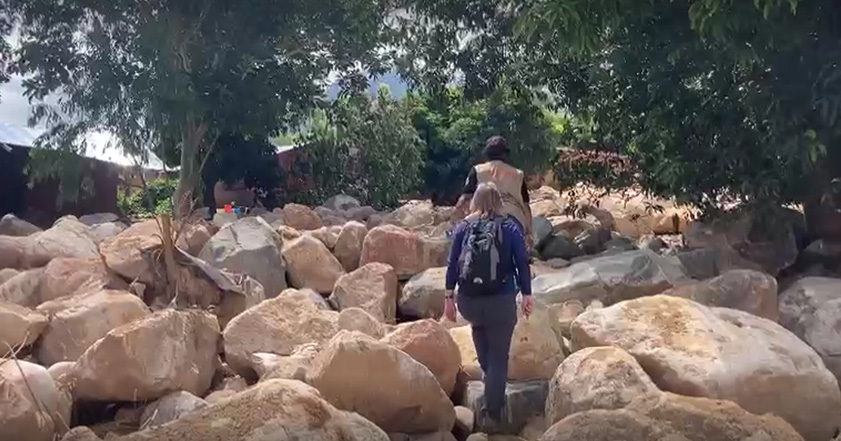Press release – 25 April 2023
The international disaster relief charity ShelterBox will be providing emergency shelter aid to people left homeless by Tropical Cyclone Freddy, which has left parts of Malawi, Madagascar, and Mozambique devastated.
According to experts, the cyclone could be the longest-lasting and most powerful on record, with Malawi the hardest hit area. Heavy rainfall led to catastrophic floods and mudslides, claiming lives, homes, and livelihoods, as well as taking out the power grid.
Almost 700 people have died in Malawi with hundreds more still missing, and others stranded in hard-to-reach areas. More than 650,000 people have been displaced and are now living in crowded rooms, camps, schools, and community centres.
A ShelterBox emergency response team deployed to Malawi to explore how the charity could best help affected people and it’s now working with CARE Malawi to provide thousands of people with emergency shelter and other essential items.
Programme Manager for ShelterBox, Melanie Hughes, led the emergency response team. She says: “The floods and mudslides have left huge scars on the hillsides, with enormous car sized rocks destroying everything in their path.
“They’ve left nothing but boulder fields in their wake that will be impossible to clear and so the people in the communities that lived there will have no choice but to move.”
Whole homes have been consumed by the mudslides, washed away or severely damaged, and many of those still standing aren’t habitable or structurally safe. The lack of adequate shelter and mosquito nets is leaving people exposed to malaria, which is already a high risk, and the spread of water-borne diseases is a growing concern. The country is already facing a cholera epidemic and the lack of clean water and unsanitary conditions will make this worse.
Melanie says: “We are aiming the aid package at those returning home once the floods have subsided. This is likely to be hard to reach areas that more recently become passable.
“Homes here are likely to be wholly destroyed and the package will therefore contain both tarpaulins, shelter kits and timber for framing. We are especially keen on providing timber to ensure that deforestation doesn’t worsen where natural resources to rebuild homes are scarce.
“People will be able to use the aid to construct a shelter that offers protection from the elements, gives safety, and provides privacy – helping people, families, and communities start their road to recovery.”
With no time for people to gather belongings before fleeing to safety, ShelterBox will also be providing kitchen sets, blankets, mosquito nets, solar lights, sleeping mats, and water filters to give people the resources they need to help protect their families.
Melanie adds: “These shelter and household items will also mean that people can move from inappropriate and crowded public buildings and schools back to their own communities, with their own space and privacy, which is so important given there has been a rise in violence against girls and women.
“Water filters are particularly important when so many bore holes are now unusable or unclean. With the epidemic of cholera, a household level water filter will help reduce health issues.”
The aid will assist communities living with the continued threat of flood and mud damage, some in rapidly constructed temporary shelters – made from grass and branches – that are unlikely to be waterproof or stand for long.
Multi-purpose cash might also be considered to help people buy what they need and start to rebuild more permanently, where possible. A lack of food means families made homeless are having to make difficult choices about whether to eat or whether to start rebuilding homes.
With road infrastructure severely damaged, many roads remain impassable, and the humanitarian response will be challenging.
It’s not the first time ShelterBox has responded in Malawi. The charity supported more than 10,000 people in the country after Cyclone Idai caused devastating flooding in March 2019.
The impact of Cyclone Freddy is reported to be five times worse than Idai with the country’s President describing it as the most devastating Malawi has experienced. It travelled across the southern Indian ocean for five weeks in February and March, making landfall in Madagascar, before Mozambique and Malawi and causing widespread devastation.
ShelterBox has an ongoing response helping people affected by the earthquakes in Türkiye and Syria. It’s also supporting people displaced by extreme weather events like the monsoon flooding in Pakistan and the worst drought to hit East Africa in 40 years. It is also supporting people displaced by conflict in Ukraine, Yemen, Syria, Burkina Faso, Cameroon, and Mozambique.
To find out more about the work of ShelterBox across the world, visit shelterbox.org.
ENDS
For more information contact the press office at ShelterBox via [email protected].
Notes to Editors

